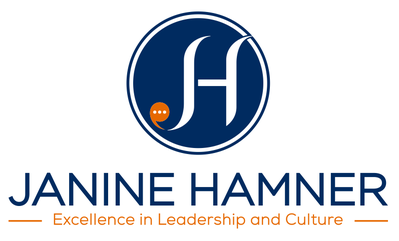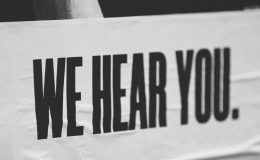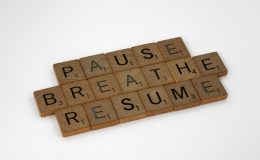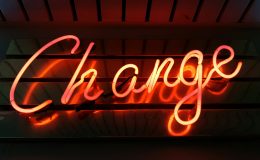
When was the last time you asked yourself why you think the way you do, and act the way you do? How often do you think about the why? In this episode, Janine Hamner Holman sits down with Lauren Hunter-Dyson, a leader in culture and workplace engagement, to discuss what allyship and inclusivity mean and why it is important.
GUEST: Lauren Hunter-Dyson | LinkedIn
HOST: Janine Hamner Holman | [email protected] | LinkedIn, Facebook, Instagram
What am I paying attention to today? The concept of allyship. If any of you have spent time in the world of diversity, equity, inclusion, and belonging, you’ve heard of allyship. If you have a good friend, yourself, a partner, or a child who is part of the LGBTQIA+ community, you may have heard this word about being an ally.
I have a complicated relationship with this word in this particular concept of diversity, equity, inclusion, and belonging. I get it inside the concept of having someone in your life who you love who is gay, transgender, inquiring, binary, non-binary, or whatever they might be. Being an ally to that because that’s something you are not inside makes sense.
I have an inherent challenge with this concept of being an ally in diversity, equity, inclusion, and belonging. I can certainly be an ally with my husband who’s black, with our biracial kids, and with people who’ve had different life experiences from me.
If what we’re talking about is diversity, equity, inclusion, and belonging, by definition, it’s a tent that includes everyone for very good reasons. For a little more than three years, since the murder of George Floyd, we’ve been having a very black-and-white conversation about diversity, and it makes sense. Even that line I said, since the murder of George Floyd, must become a telling statement. If I say the murder of George Floyd, you assume I have a particular perspective about it versus if you say, when George Floyd died or something less pointing to a verdict.
Much of this has become so political and in reality, the person, the cop who put his knee on George Floyd’s neck, that created George Floyd’s death was convicted of second and third-degree murder. Legally he was murdered. It’s this polarizing thing. I have friends who are cops. I have a good friend who’s the chief of police of a local police department. I’ve done work with the police department here in the city where I live.
It’s not that I hate all cops, but George Floyd was murdered by a police officer. That’s just what it is. Why this is a polarizing statement, why this is a political statement, is one of these places where I feel like we have to, or we’ve chosen to, or we can’t figure out how not to walk on eggshells and say things that either bring people in or have people not feel part of the conversation, which is back to my problem with the word allyship. By definition, if I’m an ally, I’m not in it, I’m adjacent to it.
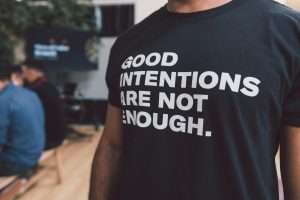
There’s nothing about diversity, equity, inclusion, and belonging that, by definition, excludes anybody. I’m a white middle-aged woman who has also spent almost two decades working for social change nonprofit organizations. I was trained by the person who trained Cesar Chavez. The idea that I wouldn’t have standing in a community where what we’re talking about is challenging issues feels exclusionary on the face of it.
We’re in this interesting and difficult place where people are being included or excluded rather than being called in, rather than being brought into the conversation. We’re in this place of not quite knowing how to have these conversations. What I do for a living is help people have hard conversations. How I’m not part of a conversation about having hard conversations, it’s a head-scratcher to me. This brings me right to our guest for today.
I am so excited to introduce you to Lauren Hunter-Dyson. She is the president and CEO of CultuHR’d. She’s a hometown girl for me. I grew up in Cambridge, Massachusetts. Lauren is a Boston Business Journal 40 Under 40 recipient, which means she’s hot sh*t.
Lauren has nearly 20 years of experience as a talent culture and DEIB professional. She holds a bachelor’s degree from Johnson and Wales University, a master’s degree from Cambridge College, and she completed legal coursework at Massachusetts School of Law at Andover. Welcome to the show, Lauren.
Thank you, Janine. It’s a pleasure to be here.
I’m so happy to have you and to be having this conversation with you. Let me start the way we often do, which is, Lauren, what is something you’ve become aware of that, whether consciously or unconsciously, we are not paying enough attention to. What’s the cost of that inattention?
I’ve thought long and hard about this question, and while there are so many things I could say, I kept coming back to the why, we are not paying enough attention to the why. Once you ask your first why, it leads to a series of more whys, which helps you get to the root cause of things. Collectively, we don’t sit down and pause before we act to ask ourselves why.
I love that. When I think of asking why and starting with why, of course, Simon Sinek pops into my head, Start With Why. When you think about that question, where’s the first place it takes you?
Often it takes me to polarizing subjects and why they are being presented the way they are in the format, in the tone, on the platforms they are on. There’s always a reason why, and there’s always an agenda for whichever way. I always start with, because sometimes we have a bias for action, and that isn’t necessarily a bad thing, but if you have a bias for action, it comes with caveats and responsibility. That responsibility is to ask why before you act.

This also makes me think about our possibility of thinking before we speak and getting grounded. Our conversation today led me to think about this concept of allyship. Part of what you and I were talking about in our pre-podcast chat was all the things we’re not saying, which is very much connected to that why and why we feel certain ways. It gives me the opportunity to talk about my complicated relationship with the word allyship.
I’m afraid of how it’s going to be received because of the judgment other people will have about me. I’m a blonde, white, middle-aged lady. Thinking of myself as middle-aged is very disconcerting. I am middle-aged, but my mother-in-law who turned 90 back in March, was saying to me at Thanksgiving she’s starting to feel a little old.
I love that. I remember when my grandmother in her early nineties was talking about starting to feel a little old. My response to that was, “If you’re just starting now, that feels like a pretty good run.”
I don’t feel middle-aged, age is a state of mind as they say. It’s a weird concept. In any event, I’m worried about how people are going to hear that, what they’re going to make up about me.
As we all know, our brain makes up a story about everything. If you hear somebody who looks like me saying a nuanced thing about allyship, it would be easy for a whole group of people to write me off and say, “Oh, well, she’s a Karen and she doesn’t get it.”
I’ve been working in the world of empowerment and diversity for my whole career, almost 40 years. That’s part of what’s so difficult about this world in which we live right now and why I love that what you’re pointing to is that we’re not asking the question, why does she have that perspective? What is it that’s leading her to have that perspective?
I was talking with a client yesterday and he was talking about how easy it is for us to write off people or throw people under the bus. I don’t have a part in that, which is also part of what you’re pointing to.
The word allyship is complicated in and of itself, right? Allyship, the way I like to think about it, is a verb. You can’t be an ally and be complacent and not do anything. I also feel like because you’re an ally, it doesn’t necessarily mean you can identify. You can empathize with someone’s situation and their story, but oftentimes if you’ve not gone through specific things or lived life in a certain way, you may not be able to completely identify with the situation.
I often say it’s different when you’ve been able to live your life on offense than when you’ve had to live your life on defense. That perspective changes how someone can be an ally to someone else. It’s really hard. Are people willing to be allies past the point of their discomfort? How much are you willing to do? For some people, you don’t get to choose. You just are who you are. You present how you present. You will always be living life on defense, whereas an ally can be an ally, but they get to choose whether or not that is visible to other people.
I can’t choose to walk out the door as my very dark-skinned black husband who is then not only a black person, but a black man. I can only walk outside in the body I have. As many of our readers know, I have struggled with my weight my whole life, and there’s a whole thing in our culture as well about being a heavier human.
Then it starts to feel like I’ve had rooms in which I’ve talked about that experience and have been met with, “Yeah, but you still get to walk around in a white body.” Absolutely. Yes, I do. It feels like we start to get into the pain Olympics, whose pain is more valid? Whose pain is more important, whose pain is more fill-in-the-blank.
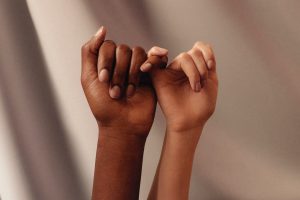
There’s nothing I can do about the fact I am in this body any more than there’s anything you can do, Lauren, about the fact you are a black woman. While I can be in allyship with you on the experience of being a black woman where it doesn’t feel like there’s any conversation yet, and it’s one of the things I think about in this body, doing this work, is it appropriate? Does it make sense? Is it valid that someone who looks like you would be in allyship with me over the hurt I have experienced?
It feels like right now, our culture says no because I am in a white woman’s body and therefore part of the dominant culture. I haven’t earned that organizational support.
That’s an interesting topic because I believe in this concept of validation, it’s part of my drive strategy, and it’s very important to validate people’s lived experiences and how they perceive life.
With that said, I think there’s an entire movement around body positivity and accepting the body you’re in, and we’re kind of getting to that place, and it’s about including people in all bodies and all shapes and sizes.
One of the challenges is this concept of body positivity is not rooted in a structural system that is meant to keep people in a specific place. Therein lies the challenge of raising these two topics at the same time. Then you get into these pain Olympics because we’re talking about something we’re actively working on, of course, and people still not feeling completely included because of the way their bodies look, behave, or move.
Trying to have that same conversation about structural racism at the same time, things that are systemic, and things we just talked about at the beginning of this conversation, the kind of unloving of a person due to someone else, those types of things, becomes difficult. Putting them in the same conversation sometimes can be challenging for folks.
Sometimes we need to separate the two conversations. We don’t have to talk about them at the same time, we can create safe spaces for each conversation. But I think there is something inherent about the challenges around things that are systemic and things that have affected the livelihood and the lives of black and brown people in ways that shape and size have not necessarily. There are two very challenging topics to address at the same time.
I want to talk a little bit about safe spaces, which you brought up. I have an interesting relationship with that concept as well. I’m so curious about your perspective on it. My perspective is while we can call people in, while we can do things ourselves to be conscious of our unconscious biases and make sure we are not saying things that are actively going to make someone feel unsafe, we can’t actually make somebody feel safe.
What we can do, I think, is create places where people have opportunities to be brave. Talking about your lived experience, no matter what it is, takes bravery even inside of a safe space. I’m curious about your perspective on all of this.
Oh goodness. On safe spaces I say, do I believe they exist and do they create impact?
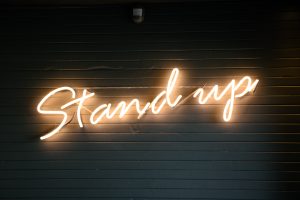
It’s twofold. We can create safer spaces for people to say what they need to say. Is any space ever going to be completely safe? I don’t know if I feel they can be. However, one of my bigger challenges with safer spaces is they often don’t result in change because there are people in the space who have experienced the same things.
We’re able to create partnership, allyship, and understanding, and vocalize how we feel about things, but those aren’t the spaces where we have moved the needle around a certain thing.
I go back to this kind of concept you were talking about, which is impact and intent. I always hear organizations or people saying, “Assume positive intent,” and it makes my blood boil because that’s not a complete sentence.
95% of people have some form of positive intent. However, you always have to be mindful of your impact because everyone’s moral compass does not point in the same direction. Positivity doesn’t mean we’re positive on the same spectrum.
We often get into this conversation with marginalized communities about assuming positive intent when someone says something harmful to them. Then it gets into this gaslighting conversation about, well, you shouldn’t have felt that way. It’s kind of like, wait a minute, time out.
We have some learning to do around allyship and assuming positive intent, being mindful of impact, and the fact we are a global society and everyone’s moral compass points in a different direction.
What do you think we do about the reality so many people of color, black and brown people, are tired of explaining to people who haven’t been exposed to it for whatever complicated set of reasons, what the impact is of the things they say?
If I say to you, “Wow, Lauren, I am so impressed with how thoughtful you are, and that’s not what I was expecting.” It’s the most awful, backhanded passive-aggressive compliment. I might not understand why it is all those things. You would be legitimately, completely fed up with having the perspective, “Poor little Janine, she doesn’t understand why that’s an incredibly insulting thing to say.”
This goes back to my original thought about what are we not paying attention to and why. My immediate response was, talk to me about why you would expect something different from me. I think people of color, and marginalized communities, have gotten to the point of no longer defending and being on defense because it’s not my thing to defend. It’s your thing to justify. Why would you say that?
If I’m not this Janine, if I’m a different Janine, and I say that to you and you say to me, “Well, why did you have that perspective? Why did you have that assumption?” I don’t know if I could come up with anything meaningful in that moment.
What I’m not going to be conscious enough to say is, “Because I’m racist and I think all black people are naturally talking sort of street English, and so I’m surprised you’re different.” That’s the answer. Am I going to be able to come up with it all by myself?
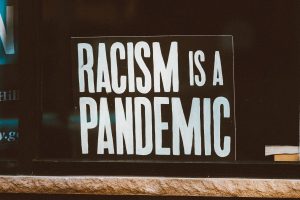
You’re not, and that’s my point. You’re going to sit there and not have anything to say, but what you can do is go back and think about why you said what you said. Whether you say that to me or not, sometimes all you can do in the moment is give someone something to think about around their biases, around how they show up, how they’re not creating safe spaces for other people, how they’re just plain ignorant. Those are the moments as a DEIB practitioner that speak to me when I’ve been able to help someone to listen, to understand, just by asking them why they would think something like that.
My perspective is it would be hard to come up with anything meaningful, and I don’t know if I could get there without help. What has been your perspective in asking those questions? Where has that conversation gone?
I love to ask the provocative question. I love to get people to think long and hard about why it is they believe what they believe, and oftentimes it takes people to, it’s what they’ve been taught, not necessarily what they’ve ever experienced. Those are the moments that come full circle. I’ve had people come back and say, thank you for asking me that question, or thank you for phrasing it that way. These are people who genuinely want to do the work. Then there are other folks who completely disengage from the conversation.
As a practitioner, I go back to that person and I’ll say to them, “How are you doing? We didn’t get to finish our conversation. Let’s revisit this because that’s the work I come in to do with folks.” I understand I have a different experience in asking that question because it is the work I do, and it’s what organizations bring me in to do.
I also understand it’s harder for people who don’t do this work and are going about their everyday lives. Maybe an engineer, maybe a doctor, just wants to do what they signed up to do.
Instead of asking the question why, sometimes people go to defense mode or they’ll answer the question and act like it wasn’t completely offensive. It’s challenging, but I do feel like everyone in this space should learn the art of asking why something came up. Even if you’re not a DEIB practitioner, you can ask why. Everyone asks why from time to time.
It’s our favorite question when we’re little kids. Why? It can be such a powerful question when we’re grownups.
It’s my number one power question. Just why.
Have there been times when that’s been especially effective, and have there been times when it’s especially challenging?
Absolutely. Yes and yes. One of the biggest things I can point to is during COVID-19, when we were having discussions about whether or not we should mandate vaccines for people,
I kept asking, why would we do something, and require people to take away their agency, and their bodily autonomy for something we don’t necessarily know right now? We don’t know. Then what?
First, we were hearing it would prevent the spread. Later on, we learned that’s not the case. It prevents a person from becoming sicker, but it does not prevent you from spreading it to another person. If that is the case, then it is my choice whether or not I want to do a thing.
It was really hard in those moments, and I had to press on why would we require a thing without asking people whether or not they wanted that thing. That’s challenging, especially when you are from a community with such a complicated relationship with medical institutions and vaccines and studies and things like that.
That’s an understatement!
Yes, it’s a very complicated relationship. I was passionate about that particular topic at the time, and I think it did a lot of good because ultimately we got to ask the right questions, we got to survey the right people, and we got to the right answer for where we were at and where the organization wanted to go, but we didn’t do it in a way that seemed forceful.
I love that specific nuance right there. We did it in a way that didn’t seem forceful.
I’m working with another client, and I’ve been doing a lot of surveying of staff and partners. Like any fairly large organization, one of the things that can happen is leadership will see a problem over here. We know how to solve that and institute a change, but it’s not what the folks who are experiencing the problem would want.
How often do we as individuals, as organizations, as leaders, fall into that trap of “I see the problem. I know the solution, and I will come and give you the solution.” In horrible gross generalization terms, it’s part of what the black community is so pissed off about. Here comes the white woman, the white man, the white whoever, with “I know the solution to your problem,” b@llsh*t.
We don’t even realize how ingrained supremacy culture is in how we eat, think, and breathe. Everything we do is built around this kind of supremacist mentality of “I know what’s best for you, so come follow me and do what I’m telling you to do.”
I’ve seen my mom do the same with my dad. It’s built into so many ways of thinking and being.
It is. One of the things I say to all of my clients, and all my organizations is that you have to plan with people, not for people. It takes a lot more time, energy, and effort to plan with people, but you have a lot more buy-in, stakeholder engagement, and understanding of a process. People generally understand when you’ve included everyone, you come up with a solution.
It may not be what they wanted, but it was an inclusive process, and it wasn’t only their perspective that mattered. People are so much more understanding about that than when you force something you didn’t talk to anyone about. Half the time, you’re coming up with policies and procedures about a thing and you don’t do the work.
I could talk to you all day. Is there anything you were hoping we would touch base on that we haven’t talked about yet?
I think it’s, what is the employer’s responsibility around these things? It’s foundational to our society. Everyone works in different ways and has different things, and when we talk about the why, when we talk about allyship, when we talk about planning with and for people, we need to understand how employers are championing all of these messages. How are we leveraging these conversations, and these resources, and making sure we are creating inclusive and accessible workplaces that address all of these issues in inappropriate ways?
What a beautiful note to end on. Lauren Hunter-Dyson, I want to thank you so much for your bravery, for your willingness to ask, and joy in asking the hard questions, for your nerve, and for your love of these tricky, messy, challenging, exciting, invigorating conversations. Thank you for who you are and who you be.
Thank you so much, Janine.
It has truly been my honor to have this conversation with you. I am Janine Hamner Holman, and this has been The Cost of Not Paying Attention. Remember, great leaders make great teams. Until next time.
Important Links
About Lauren Hunter-Dyson

Lauren Hunter-Dyson is the president and CEO of CultuHR’d. She is a Boston Business Journal 40 Under 40 recipient. Lauren has nearly 20 years of experience as a talent culture and DEIB professional. She holds a bachelor’s degree from Johnson and Wales University, and a master’s degree from Cambridge College, and she completed legal coursework at Massachusetts School of Law at Andover.
